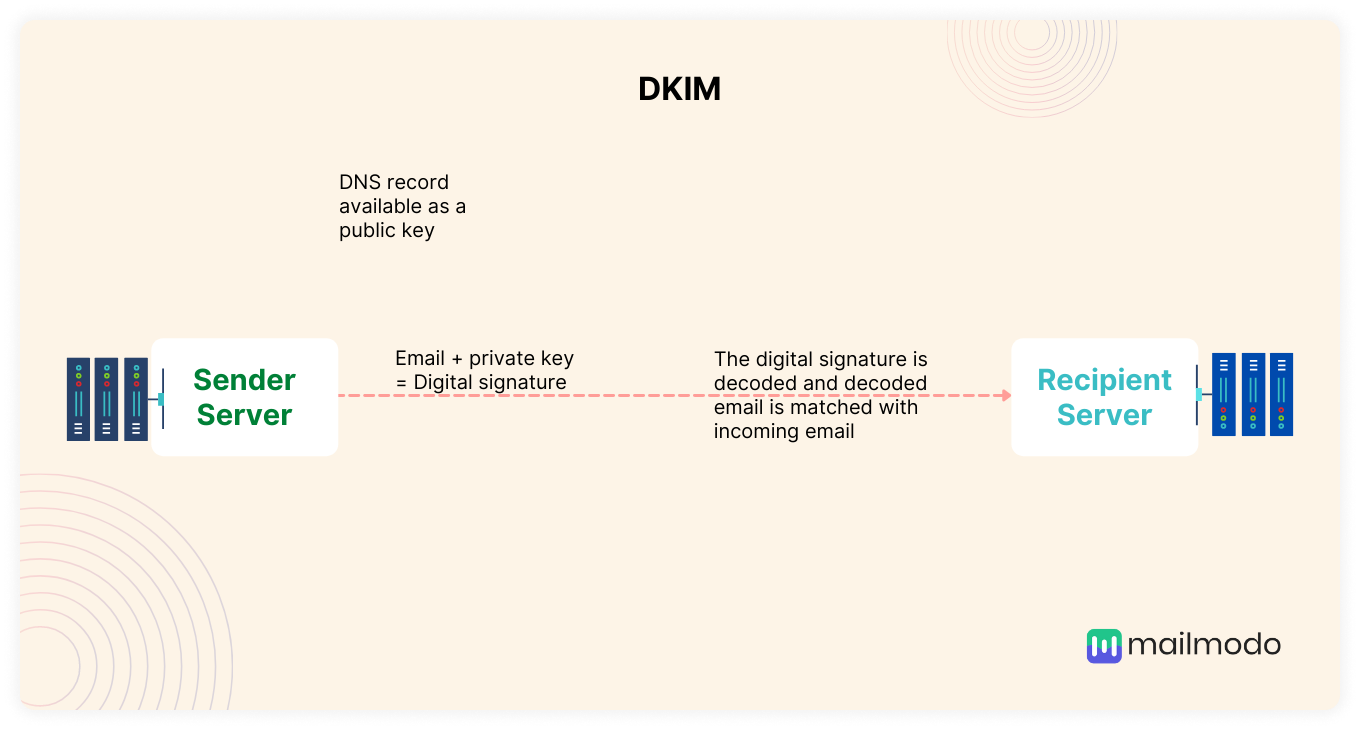Kings in the old times would send letters to each other with a stamp. If the stamp were intact, it would indicate that the letter hasn't been tampered with. Similar to the stamp, emails are signed by a DKIM signature.
Table of contents
- What is DKIM?
- Where and why DKIM is used?
- How does DKIM work?
- DKIM for AMP email approval from email clients
- Is Mailmodo compatible with DKIM?
- Conclusion
What is DKIM?
Domain Keys Identified Mail (DKIM) is an email security standard that ensures messages are not modified while traveling between the recipient and sending servers. DKIM permits organizations to take responsibility for transmitting a message in a way a recipient can verify. The organization can be the originating website, intermediary, etc. Their reputation is the basis for evaluating whether or not to trust the message for delivery.
Where and why DKIM is used?
When you have a DKIM signed email, it tends to be more legitimate to your recipients, and there are lesser chances for your email to reach spam or junk folders. Once a message has been signed using DKIM, a receiver uses this information regarding the signer to decide how the message will be treated. Messages from a signer with a good reputation will be subject to less inspection and scrutiny by the receiver's spam filters.
Also, Gmail can track reputation only if DKIM is signed on the sender domain.
How does DKIM work?
When an email is sent, there may be an intervention in the pipeline by a hacker. This may result in the email content getting forged. So, to address this issue, anti-spam bodies have conceptualized the DKIM record.
This happens with the help of a simple encoding and decoding method as follows:
- Sender level
The email combines with a private key available at the sender server software to form an email signature. This signature is sent to the recipient along with the actual message.
- Recipient level
There’s a Domain Name System (DNS) record published in the world, available as the public key. The DNS record looks as follows:
m1._domainkey.yourdomain.com | TXT | v=DKIM1\; p=MIGfMA0GCSqGSIb3DQEBAQUAA4GNADCBiQKBgQDPtW5iwpXVPiH5FzJ7Nrl8USzuY9zqqzjE0D1r04xDN6qwziDnmgcFNNfMewVKN2D1O+2J9N14hRprzByFwfQW76yojh54Xu3uSbQ3JP0A7k8o8GutRF8zbFUA8n0ZH2y0cIEjMliXY4W4LwPA7m4q0ObmvSjhd63O9d8z1XkUBwIDAQAB
In the above example, "v" is the DKIM version, and "p" is the public key. This public key encodes the email signature, and the incoming email is compared with the decoded email. If the two match, that indicates the email hasn't been tampered with.
The process looks as follows:

However, if DKIM isn't passed, no authoritative action is taken. The email is still delivered.
DKIM for AMP email approval from email clients
If you want to reap the benefits of sending out interactive AMP emails, you will have to get whitelisted with Yahoo Mail, Gmail, and Mail.ru which support AMP emails. For a successful whitelisting of your sender address, these email clients require DKIM.
Is Mailmodo compatible with DKIM?
Yes, Mailmodo is compatible with DKIM. Our email specialists team helps you understand the importance of security certifications and build your IP & Domain reputation for high email deliverability. Furthermore, we help our users set up DKIM without any hassle to get whitelisted for AMP email from email clients.
Conclusion
Security certifications increase your sender's reputation and consequently provide you with better email deliverability. Growing businesses that depend on digital presence need to have an established practice to plan and follow these guidelines.
If you are looking to create and send interactive and actionable emails that get delivered right into your user's inbox, feel free to reach out to us today.


